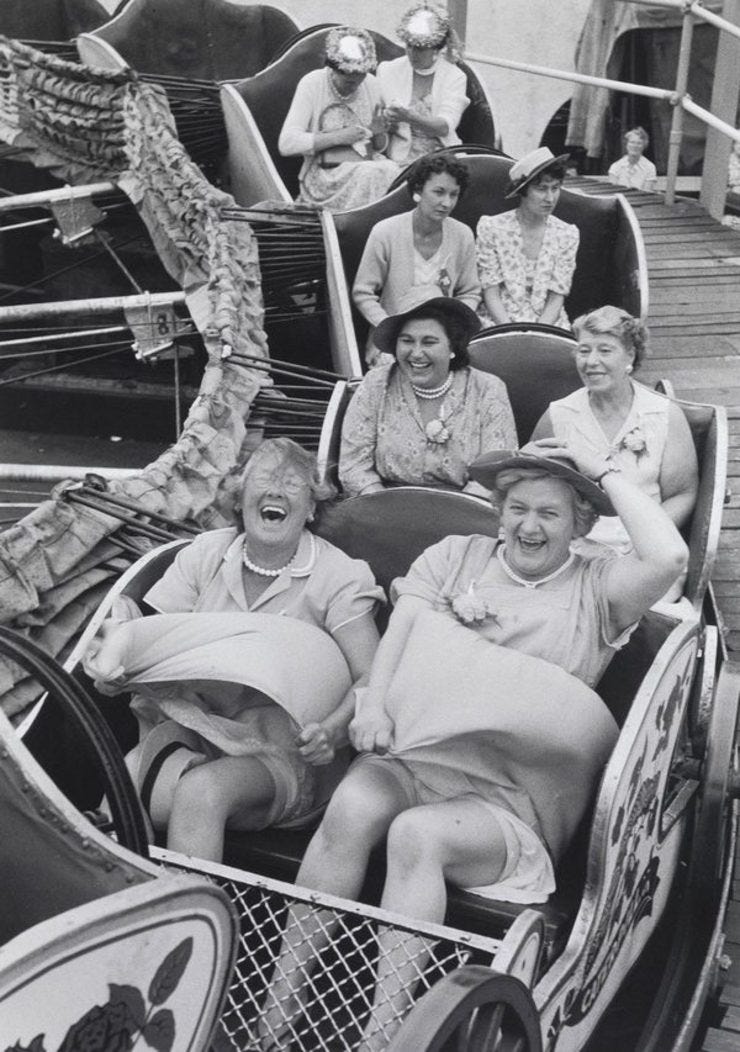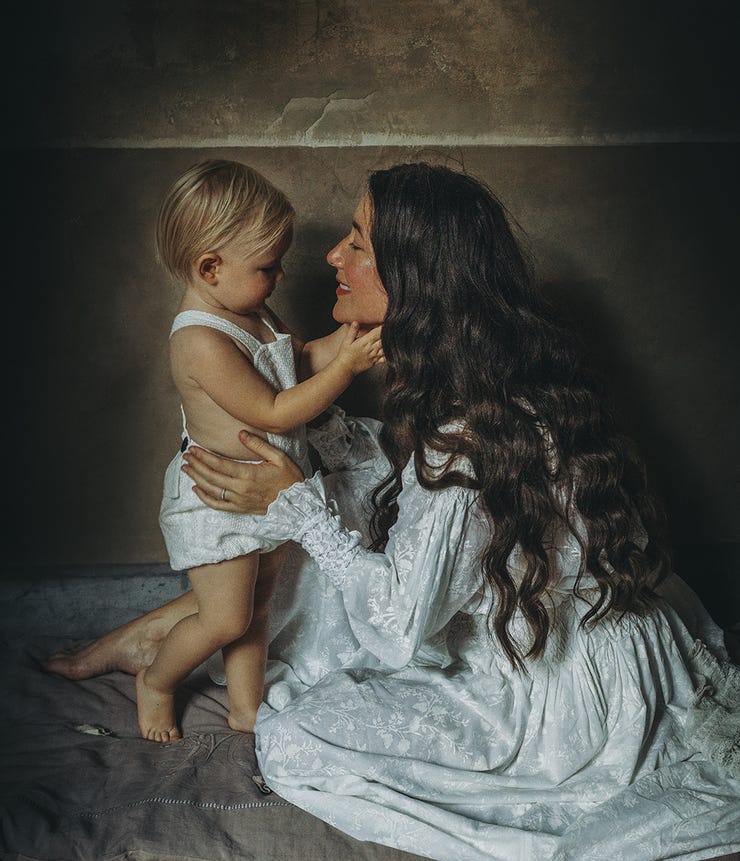"Brush your teeth, brush your hair, shush I'm working."

Hi friends,
Is motherhood the enemy of creative work? That certainly seems to be the question that hangs in the air all too often whenever mothers who work in creative fields are interviewed.
I feel conflicted when I see those 'how do you do it all' questions asked. On the one hand, I'm angry, because so rarely do we even know that men in creative fields are fathers, let alone ask about how they work and parent (did you know that Tolstoy had 13 kids?). But on the other hand, as someone for whom being my best creative self and my best parenting self is a daily struggle (and juggle) – I really do want to know how they do it.
When she wrote about needing "a room of one's own", Virginia Woolf was outlining how women need money and space in order to create (and, I assume, if you're a parent that room better have a door that shuts firmly).
Studies have shown that during the pandemic, mothers were more likely to work in common areas instead of dedicated home office spaces (though that's not something new) and more likely to carry out more domestic responsibilities while working flexibly, so in some ways it's not surprising that these questions get asked.
So – how do they do it? And why do we care? Let's get stuck in.
How we do both: the dangerous myths surrounding motherhood and creativity
As anyone with kids knows, carving out the time to be curious and create something is hard.
Toni Morrison wrote around the distraction. Jodi Picoult sacrificed sleep. Julia Cameron said "Mommy's working" and modelled autonomy.
Part of the difficulty can be attributed to the snack demands of the tiny people we share our homes with, but part of it is also down to the idea that in order to be creative you need to be selfish, free.

Joan Didion's late daughter Quintana once nailed a list of "Mom's sayings" to the garage door that included "Brush your teeth" "Brush your hair" and "Shush I'm working."
Although Didion's quips sound like something so many of my mum friends could've said at any point over the last few months, as this (controversial) Atlantic piece points out, it became "a symbol of Didion's maternal negligence".
In her essay On Women’s Work and the Myth of the Art Monster, Rebecca Solnit explores the toxic myths that exist around creativity, and how crippling outdated concepts about what you have to give up in order to create can be:
“The idea that you “abandon some nurturing part of yourself” suggests that you can’t be kind and supportive and write, and that the kindness part of women’s lives is inevitably onerous.”
Similarly, author Zoe Brigley Thompson talks about how for so long, the image of someone being creative entailed "an individualism that cannot be maintained well in the life of domesticity and being a good parent”. She writes:
“... we have to defy stereotypical imaginings of what creativity looks like. The tortured male genius with the sensational life is a dead end as a productive route to creative success.”
When it comes to what mothers really need in order to create, Zadie Smith wrote this eight years ago – and this year has shown how true it all still is:
"The idea that motherhood is inherently somehow a threat to creativity is just absurd. What IS a threat to all women’s freedoms is the issue of time, which is the same problem whether you are a writer, factory worker or nurse. We need decent public daycare services, partners who do their share, affordable childcare and/or a supportive community of friends and family".
Shaking off "the stank of uncool motherhood"
As much as we need to give mothers the time and space to create, parenting itself needs to be seen as a valuable part of the creative process, and not always an enemy of it.

When talking about her book exploring art and motherhood, co-author Qiana Mestrich explains how biased the art world at large was against the idea that women could be artists and mothers:
"I’ve heard stories of artist moms having to deny or avoid the subject of having kids and even going as far as working under a male pseudonym in order to avoid being marginalised and having their work devalued."
In Mother, Monster, Writer, Maid, a brilliant piece I've read and re-read, Rufi Thorpe writes:
"I get annoyed when women’s magazines try to edit my motherhood out of my work. I get depressed when they won’t run a piece unless I take out any mention of my having children. I firmly believe that having children has made me smarter and better and more interesting, and fuck you to any women’s mag that doesn’t think so too."
Her essay explores how damaging and devaluing it can be to not see being a mother as a rich and meaningful source of creativity:
“It is easy to dismiss the inherent interest of raising children because such a profoundly meaningful period in life comes to us cloaked in so many boring and pedestrian details: breast pumps and counting wet diapers, homework and vaccination schedules. But any soldier will tell you that much of the Army is similarly boring and routine. Yet we do not ask a war poet, Do you ever worry your work will become clouded with bureaucratic detail? We assume that he can reach past the quotidian to the elemental, and we should demand the same of mothers.
There's no easy answer, but it's becoming clear that there is a lot more to the question.
Our mothers before
What can we learn from images of the women we never met? That was the question best-selling author Edan Lepuckiis set out to explore in this brilliant Instagram series. She shares pictures of people's mothers before they were parents, and it's also now a gorgeous book. The captions are so beautiful and poignant. I love this, from the introduction:
It takes respect and compassion to consider the woman we will never get to know and to try and square her with the woman we do know, and to accept that not all the discrepancies will be resolved. For some of the contributors, their experience of reading their mothers is a celebration. For others, it’s a reckoning. Either way, it’s work. It’s an effort of love.”
(I adored poring over my mum's photo albums as a kid – it's one of the reasons I was so drawn to photography. A child actor on an Irish travelling roadshow, she became a circus performer, and then a trapeze artist and tiger tamer in Mexico, all before she was 35!)
Bringing up bebe
Jamie Beck, a huge photographer crush of mine, has launched a newsletter and in a recent edition she talked about finding her way back to creativity after her daughter Eloise was born:
"Everything stopped. My energy, my ideas, my time. It was scary, really, for me to wonder if I’d ever feel like a photographer again. Feel worthy of creating. Now I can laugh at that as I’ve since had time to sleep, reclaimed my body, and eased back into work and discovered I not only have more to say but I am enjoying and appreciating it all in such a deeper way."
You can read more here.
Things I read and loved this month
Made me laugh: The UX on this small child is terrible.
A very sweet, funny and sincere stop-motion short exploring 'the motherhood penalty' in the workplace
"When I hear “I don’t know how you do it,” my answer is “I don’t!" A pragmatic and refreshing read on pareting during the pandemic.
Here are 10 reasons to write a book.
I'll leave you with...
Tackling tricky transitions
Toddler transition times get a lot of coverage, but how about for us grown-ups? When work-home-parenting-life is all happening under one roof it can take a while to get in the zone, and similarly tough to be able to engage and be present once you’re done working, and not let whatever you’ve been immersed in consume the rest of the day.
I'm finding short, sharp habits are helping a lot: A quick morning 'commute' around the estate before heading upstairs to work, and this lovely, grounding 5-minute meditation by the wonderful Jodie before I head back down to Ari.
That’s it for this month. If you have any feedback, article recommendations or just want to say hi, I’d love to hear from you.
Thanks for reading, and see you next month,
Nathalie




